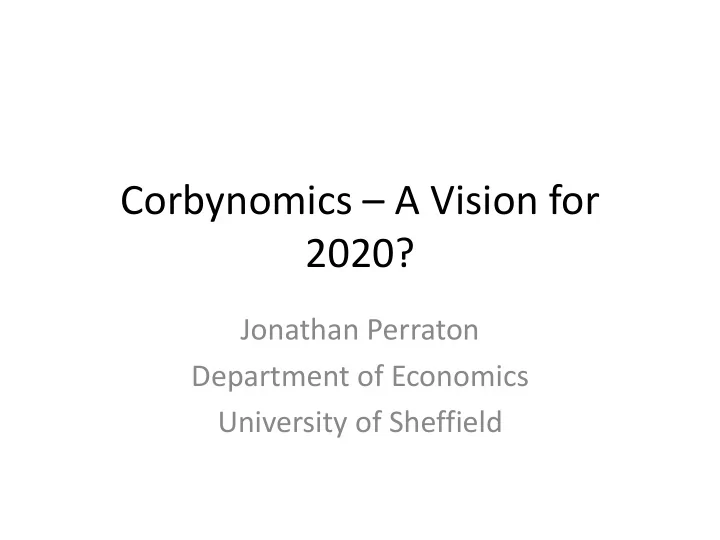

Corbynomics – A Vision for 2020? Jonathan Perraton Department of Economics University of Sheffield
Corbyn’s Vision • Changing the terms of economic debate • Austerity has held back growth, but also led to an unbalanced and unequal economy over-reliant on debt-fuelled consumption and characterised by weak investment, low skills and a large external deficit. Gains from growth are skewed towards richest groups and regions • Higher productivity economy needed to raise wages; this is also needed to reduce the deficit • Prosperity requires a new partnership between government, businesses and workers
G7 Investment Rates
Key Policy Proposals • Ending austerity – cutting in a downturn does not produce growth. Now reject Osborne’s fiscal charter. Case for spending on infrastructure and skills (adult and further education; HE) • Creation of a National Investment Bank as part of strategy to up- grade UK’s industrial structure and encourage investment and innovation; particular emphasis on key industries including green technologies • Shift in taxation to finance this; possible ‘People’s QE’ • Possible state ownership, although not clear beyond rail
‘People’s QE’? • The National Investment Bank could issue bonds, these could then be purchased by the Bank of England directly to support this • The BoE QE, they purchase govt bonds indirectly (from private holders of these assets); unequal and of questionable effectiveness • Latterly John McDonnell appears to have distanced himself from this
Tax and Spend • Have now rejected fiscal charter – a downturn, with very low interest rates exactly the time to spend on infrastructure etc. Grow the economy to solve the deficit • Tax burden to shift (make more progressive, possible changes to higher income tax rates, corporation tax, inheritance tax) • Key proposals to increase tax take: improve collection of tax owed (increase HMRC staff); close loopholes; tackle underground economy; reduce expenditure on ‘corporate welfare’
Question Marks • Much of the analysis of the problems of British economy is widely shared • Austerity has been widely criticised by economists; Osborne’s fiscal charter also rejected • QE – undermining BoE independence (McDonnell denies this and arguably already compromised); unnecessary with very low interest rates anyway? • Tax – estimates of potential take from these measures appear high; ‘corporate welfare’ covers a wide range of activities, not all of which a Corbyn govt would wish to discourage
The Capital Dilemma • Democratic left governments wish to intervene in markets to change outcomes, redistribute income, build a welfare state • But prosperity still depends on private investment; investment has been low despite low interest rates, relatively buoyant profits • Investment has been weak in the UK even before the financial crisis; firms overall have accumulated large cash surpluses, rather than borrowing to invest • Corbyn plan sees a sustained recovery in investment as central – higher demand from an end to austerity and the NIB may help • But in general there is little detail here on how investment might be encouraged, and some proposals that might discourage it • Keynes wrote of ‘socialisation of investment’ by the state if private investment was insufficient to guarantee full employment • Return of the dormant bond market vigilantes?
Recommend
More recommend